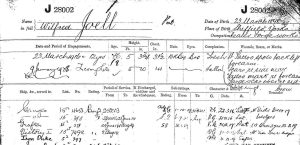Episode eight of series 20 of Who Do You Think You Are? explored the family history of comedian Chris Ramsey. The episode had a strong naval theme and revealed Chris’s family connection to both WWI and WWII. Read on as we delve into the episode, reveal some of the records behind the names and provide some hints and tips for researching ancestors who served at sea.
Dryden Gordon Young
During this week’s episode of Who Do You Think You Are?, comedian Chris Ramsey discovered a connection to WWI through his great-grandfather Dryden Gordon Young. Dryden enlisted for service in November 1914 and joined the Royal Naval Division in January 1915, a land-based division of surplus men from the Royal Navy and Royal Marines. Dryden’s first taste of action would come during the ill-fated Gallipoli campaign of 1915-1916, pitting the Allies against the Ottoman Empire. Dryden arrived with his battalion in May 1915.
Dryden made it through the campaign; however, he was reported as wounded in the Casualty Lists issued by the War Office from 17 June 1915. The episode revealed that Dryden received a bayonet wound to his cheek during an attack on enemy trenches. You can track the fate of ancestors reported missing, dead, wounded or prisoner of war during WWI with our Daily Reports collection. Entries in this collection can help you to piece together key elements of your ancestor’s wartime service.
Many of Dryden’s comrades didn’t survive the fighting in Gallipoli. The Allies suffered around 213,000 casualties, 145,000 resulting from sickness. This didn’t spell the end of Dryden’s war. Dryden was spared service on the Western Front during the Somme Offensive of 1916 after developing scabies. However, he saw service on the Western Front in 1917 and was taken prisoner at the end of the year. 192,000 British and Commonwealth service personnel are estimated to have been taken prisoner during WWI. Many would suffer from malnutrition, but Dryden lived to tell the tale and returned home. A War Office Daily List dated 4 December 1918 revealed that Dryden had been released as a prisoner of war in Germany and had arrived home in England.
According to our Royal Naval Volunteer Reserve Ratings Campaign Medal Rolls 1914-1920, Dryden was entitled to the 1914-15 Star, British War Medal and the Victory Medal.
Alf Ramsey
During the episode, Chris also explored the military service of his grandfather Alf Ramsey, who served with the Royal Navy during WWII. Alf served on the Arctic Convoys aboard HMS Ulster Queen. During the campaign, Allied ships braved the treacherous waters and hazardous conditions of the Arctic Ocean and enemy attacks to provide the Soviet Union with much-needed supplies. The Ulster Queen was tasked with escorting the merchant ships carrying supplies.
Later in the war, Alf joined HMS Speaker, part of the British Pacific Fleet fighting the Japanese. Speaker arrived in Tokyo Bay on 30 August 1945, following the end of WWII. The official Japanese surrender was signed in Tokyo Bay on 2 September, and Speaker was anchored nearby. Speaker sailed into Nagasaki in September 1945, with Alf witnessing first-hand the impact the atomic bomb had on Nagasaki.
Tips for naval research
Service records
A sensible place to start your research into a naval ancestor, particularly one who served during either world war, is with their service record. Service records provide a fascinating insight into our ancestors’ naval careers, offering details like:
- When they enlisted
- The ships they served on
- The dates they served aboard
- The promotions they achieved
Some records even contain useful genealogical information, like the person’s date and place of birth, their occupation and sometimes, their next of kin details. They can also provide clues to help you search other military collections. Try searching for your ancestors in our navy service record collections:
Royal Navy Registers of Seamen Services (covering 1848-1939)
Royal Naval Reserve Officers Service Records 1862-1964
Royal Naval Volunteer Reserve Service Records, 1914-1919
Royal Navy Patrol Service Officers’ Service Cards, 1904-1970
Women’s Royal Naval Service Index, 1917-1919

Service records for members of the Royal Naval Division, like Chris’s great-grandfather Dryden, are held at The National Archives in Kew.
If your ancestor served with the Royal Navy during WWII, like Chris’s grandfather Alf Ramsey, you will need to apply for their service record from the Ministry of Defence (MOD). Applications can be completed online via the MOD website.
Medal collections
Medal records can be a vital source for family historians, offering useful military and genealogical information. It’s also interesting to know the medals our ancestors were entitled to, indicating the campaigns or wars they fought in. Whether you’re at the beginning of your research journey or a seasoned pro, medal records are always of great interest and value.
If your ancestor served with the Royal Navy, try searching for their name in the Royal Navy Medal Rolls 1793-1955. Entries for WWI indicate the medals they were entitled to and how they were issued. The following letters represent different WWI medals:
St = Star (This is usually the 1914-15 Star. If the seaman was entitled to the 1914 Star, it is usually written as ‘1914 St’.
V = Victory Medal
B = British War Medal
Entries in this collection vary, but you may encounter a rank or rating, a number, a ship served on, and the type of award. These details will help you to search other naval collections, such as service records, casualty records or ship’s logs. Since the navy did not maintain service records for ratings (non-officers) prior to 1853, the collection is of great importance to researchers of this period.

The Naval Long Service and Good Conduct Medal Roll is always worth searching for naval ancestors. The medal was introduced in 1831 and was awarded to all non-officer ranks (ratings) who matched the criteria for both long service (15 years plus) and good conduct. Entries vary but may include:
- Name
- Date of issue
- Number
- Rank
- Ship
Other naval medal collections available on Forces War Records are:
The Jack Clegg Memorial Database of the 1914 Star Medal to the Royal Navy & Royal Marines
Royal Marines Campaign Medal Rolls 1914-1920
Royal Naval Volunteer Reserve Ratings Campaign Medal Rolls 1914-1920
Casualty records
Researching casualties is a sad and poignant part of military genealogy.
FWR Tip: The term casualty is often used to describe those who were wounded, missing and prisoners of war, in addition to personnel who were killed in action.
Casualty records may reveal basic military details about your ancestor and might even record their next of kin. Knowing when your ancestor became a casualty can help you add further detail to the timeline of their military service. If they were taken prisoner, you could consult contextual records like ship’s logs (more on these later) on their date of capture to see what action they were involved in. If they were wounded, it might explain why they were discharged early from the navy.
For personnel who died during either world war, the WWI & WWII, Commonwealth War Graves Commission Death Registers are a good starting point.
Other casualty records in our vast collections include:
Royal Naval Division Casualties of The Great War, 1914-1924
Royal Navy medical treatment at Sea and on land 1914-19
WWI, Daily Reports: Missing, Dead, Wounded and POWs, 1914-1918
WWII, Daily Reports: Missing, Dead, Wounded and POWs, 1939-1947
Don’t forget prisoner of war records, which can offer revealing details, like when and where your ancestor was captured and where they were incarcerated. The following WWI POW collections are available on Forces War Records:
British Red Cross & Order of St John Enquiry List of 1917
UK, Princess Mary’s Gift Box POW list, 1914
Further research
Newspapers are a valuable source for researching military ancestors. You may encounter obituaries detailing a veteran’s military service or an article noting they had enlisted. During both world wars, newspapers were full of military articles. Sometimes you’ll find photos of service people, extracts of their letters, details of their capture or casualty lists recording the wounded, missing and, sadly, the dead.
Ship’s logs are an interesting source for naval research. Held at The National Archives in Kew, they offer an insight into a ship’s daily activities and movements. They can help you to understand what your naval ancestor was experiencing and add further context to specific events in their naval career.
Cover Photo: BBC Media Centre
Sources
BBC, Who Do You Think You Are?, Chris Ramsey, accessed July 2023.
Imperial War Museums, Nine Reasons Why Gallipoli Was One Of The Worst Fronts Of The First World War, accessed July 2023.
The National Archives, British and Commonwealth prisoners of the First World War and previous wars, accessed July 2023.


